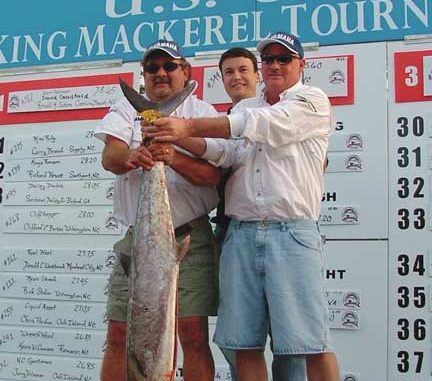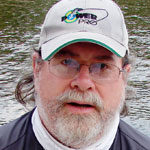
Internet chat boards have been buzzing recently with conversations about several of the pioneers of king mackerel tournament fishing.
It made me think about some of the anglers who got me involved in the sport and were trend-setters when I first began tournament fishing almost three decades ago.
I’ll do my best to give credit where it’s due, but I may forget a few, or maybe not have met one of someone’s favorites, so I apologize for that in advance and beg forgiveness for my failing memory. But I hope this group will be fairly complete.
One chat board listed me as one of king mackerel fishing’s pioneers. While I appreciate the compliment and hope some anglers have been positively affected by something I’ve done or written, I don’t see myself as one of these pilgrims of piscatorial progress.
I wasn’t quite a Johnny-come-lately, but I was at least a half-generation behind the folks I consider king mackerel fishing’s pioneers and rode into the arena on their coattails and through some doors they’d already opened. (Editor’s note: Jerry Dilsaver was selected to the SKA Hall of Fame in July, after this column was written.)
The postings and banter also made me realize many of the newcomers to our sport don’t know about many of these ground- (or ocean-breaking) anglers.
I thought our September issue, which marks the beginning of the fall Carolina kingfishing tournament season and is where the great tradition of Carolina king tournaments began, would be an excellent place to offer up a salute to some of the individuals who laid the groundwork for the current crop of king mackerel fishermen, tournaments and the equipment and tactics we employ to chase the prize.
Without a doubt, the Cape Fear area is the cradle of live bait, slow trolling for king mackerel. Don’t bother to argue — just accept this fact because there’s no way around it.
Several stories are told regarding the fishermen from Carolina Beach and Southport and how the technique began.
I’ve listened to most of them and believe I’ll give the nod to the Carolina Beach crew as being the first to troll live baits for kings. However, I believe they brought the basics of this technique from winter sailfishing trips to south Florida where the fishermen cursed the large kings that gobbled their precious goggle eyes intended for sailfish.
However, simply live-bait fishing for kings wasn’t a new local idea. Pier fishermen had been doing it for years and many of the original successful tournament fishermen got their start at Carolina piers.
Once they moved from the piers to boats, they were anchoring and fishing live baits beneath floats and balloons. It was a natural and logical progression.
I began pier fishing for king mackerel in the late 1960s. We used mullets, bluefish, spots and other shiny fish as baits.
Just a couple of years later, I managed to get to use our family boat on my own and began heading out to some of the known nearshore structure and put out live baits tethered under balloons while anchored. I have heard many similar stories from fishermen all along the N.C. coast.
The Carolina Beach fishermen I remember as some of those first successful king mackerel tournament fishermen included Ronnie and Jerry Lewis, Harold Hegler, J.E. Simmons, Lynn Ray Williamson, David Franklin, Carl Snow (Jr. I believe), Dennis Barbour and Freddy Holland.
From the 1970s to somewhere in the 1990s, several of these names would be near the top on almost every tournament leader board. For many years, it seemed like every one of them was annually on the leader board at the Greater Jacksonville (Florida) Kingfish Tournament, which was and remains the largest king tournament in the country. Several continued fishing for a few more years and most still fish, just more often for other species than for kings and rarely in tournaments.
The Southport fishermen I remember from this time are Bill Coring, Tommy McGlammery, Luther Dishman, Jerry Helms, Sr., Lonnie Broadwell, Earl Clewis, Buck Smith, Stanley Rheder and Dale McDowell.
These fishermen enjoyed similar tournament success to the Carolina Beach fishermen and were always a threat to win any tournament they entered. I include Jack Wood in this group even though he’s from Rolesville. He learned the trade from McGlammery, Coring and others in the Southport group.
Sometime in the early to mid 1980s, a young upstart, Clayton Kirby, began dominating king tournaments along the east coast. Kirby, who was from Richlands, learned to catch kings at Topsail Island’s piers and followed the progression to a boat.
He was so enthralled with king mackerel fishing, he soon found a job that allowed him to move to Wilmington and be absent to fish tournaments. He eventually found a job as a factory representative and pro tournament fisherman for Fountain Powerboats and in 1991 became the first Southern Kingfish Association Angler of the Year — a feat he repeated in 1997.
Several other fishermen began generating tournament résumés at about this time. Perhaps some of you remember the original Mac-A-Tac Fishing Team of Don Atkins and Randy Spainhour. They were from Winston-Salem but spent enough time along the southeast coast to become genuine threats at any tournament. After a hiatus of several years in the late 1990s and early 2000s, they’re fishing again as Team Gain at the FLW Kingfish Tour and Series. Longtime friend Joe Buie has joined them.
Meanwhile, in the Morehead City area, a pair of fishermen were making a name for themselves and getting a big trend started.
Clifton Moss and Lewis Taft, were from Greenville but fished the Cape Lookout area regularly and on Nov. 11, 1985, caught a monster king that stood as the N.C. record until April 19, 1999. Moss was the angler of record for the fish that weighed 79 pounds and was 63 ½ inches long with a 28-inch girth.
The king that displaced it in 1999 was caught by James Winch, off Ocracoke and weighed 82.25 pounds. It was 66-inches long and had a girth of 28 inches. These kings stand second and third in state fishing annals and are opped only by Norton Thornton’s 90-pound world-record mackerel caught off Key West, Fla., during 1976.
Several other influential early king anglers are from Greenville. One who always did well in tournaments in the Morehead City area was Pete West.
Rom Whitaker was another of those early successful king fishermen. While he moved to Greenville from nearby Kinston to run the Coca-Cola plant in Greenville, I decided to include him in this group.
Just a few years later, Whitaker decided he enjoyed being on the ocean too much to live without it and moved to Hatteras to become one of the most successful charter captains in the Hatteras fleet.
While he calls Greenville home, Dan Upton spent many of the early years of tournament king fishing as a sales rep and fishing team coordinator for Hydra-Sports and Fountain. Several years back, he made the move to Donzi and still heads their fishing team. Upton has been an SKA national champion and continues to win tournaments while paired with Jack Wood.
On a national level, I’ve been fortunate enough to meet Alex Leva of Tampa, Fla., who worked with Dan Upton at Hydra-Sports and is still the sales manager for the company. Leva and Hydra-Sports pioneered some of the sponsored fishing team ideas during the 1990s when they teamed with Wendy’s restaurants to create the Wendy’s Hydra-Sports Fishing Team.
Staying on the west coast of Florida, Gene Turner is a dedicated angler and conservationist who is credited with being the driving force in bringing fishery reforms that fostered the return of king mackerel to the central Florida Gulf coast. Turner is getting on in years but was a force to be reckoned with when the SKA began its west Florida divisions in the early 1990s. He still fishes occasionally with his son, Chris.
Several enterprising persons and groups were pioneers in bringing anglers together for a weekend and to benefit the coastal communities. Early tournaments were created to raise funds for civic causes and groups (rotary clubs, fire departments).
A few entrepreneurs carried it even further. Country musician Arthur Smith, of the regionally televised Arthur Smith Show from the early 1950’s, and his son, Clay, began the Arthur Smith King Mackerel Tournament in Myrtle Beach. They brought awareness to the state of Little River Inlet and became a driving force in getting the jetties built there. The Arthur Smith tournaments expanded to include a king, dolphin and wahoo event in south Florida and a bluefish event in the northeast. The Smiths brought in auto manufacturers and other non-boating or fishing sponsors and showed tournaments could be run as a business.
In the fall of 1990, fishermen whose names were on many king mackerel tournament mailing lists received a letter from John Jones, of Brunswick, Georgia, heralding the beginning of a new king mackerel tournament organization just for them—The Southern Kingfish Association (SKA). The SKA grew quickly and held its first national championship in Treasure Island, Florida in the spring of 1993. Ownership of the organization changed to Jim Armstrong and Jack Holmes, then added Sid Steverson, then to just Steverson and currently to a group of owners with Holmes and his wife, Deona, as the managing partners.
The SKA sanctions local tournaments as regional events and hosts a self-contained and produced professional tour. A national championship tournament is held each year and has been hosted in North Carolina twice, once in Wilmington (1997) and once in Morehead City (2000).
FLW Outdoors, which is a partner company of Genmar Boat Group, is in the third year of operating the Wal-Mart FLW Kingfish Tour and second year of the Wal-Mart Kingfish Series. The FLW events are self-contained and self-produced. The Kingfish Tour is a professional series while the Kingfish Series is a regional series. Championship tournaments are held in both tours, with the inaugural Kingfish Tour Championship having been held in Morehead City in October 2005.
Several other competition organizations have operated for a while at different times, but lacked the funds or personnel to expand and ceased operation.
This is a brief overview of some of the pioneers of competitive king mackerel fishing. While needing to remain short to fit in the allowed space, my intended purpose was to mention those who were instrumental in bringing live bait king mackerel fishing and the competitive king mackerel arena from its beginnings to its current status. If I have omitted anyone, it was not intentional and I apologize.
Hopefully everyone will recognize several of the names mentioned and be aware of their contributions.
If you weren’t already aware of these folks and their impact on the sport we love so dearly, hopefully this overview will intrigue you to ask more questions and learn more about our humble beginnings.




Be the first to comment